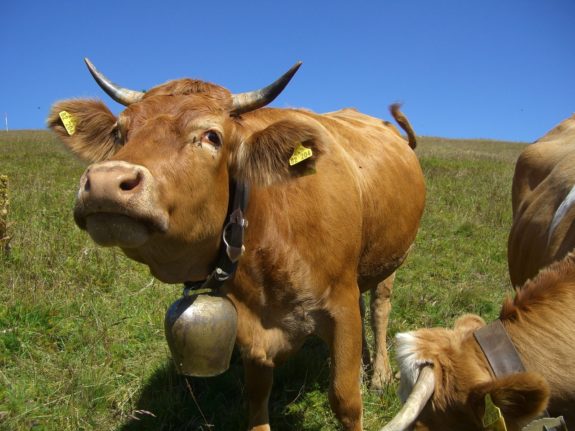Disputes over cowbells are nothing new in Switzerland, where disagreements between the pro-cow factions and residents who like to have a good night’s sleep occasionally erupt (read more about this below).
The latest such incident is ongoing in the small community of Aarwangen, in canton Bern.
The peaceful existence of this picturesque village was disrupted by two newly arrived couples, who lodged a complaint with the municipal authorities against the around-the-clock ringing of cowbells emanating from nearby pastures.
The complaint sparked an uproar among the residents, who decided to take the bull by the horns and launch a referendum to preserve the bell ringing — not just from cows, but also from churches.
About 1,100 people (approximately a third of those eligible to vote) have signed a petition to this effect so far.
“It’s about much more than animal bells. It’s about the Swiss way of life, what we care for, and how we want to preserve the culture and traditions of our country,” Andreas Baumann, president of Aarwangen’s pro-bell committee, told SRF public broadcaster.
In Aarwangen (BE) wollten Zugezogene das Geläut von #Kuhglocken verbieten. Dagegen kämpfen Anwohnende mit einer Initiative.https://t.co/rtHILgz9DH
— SRF News (@srfnews) November 1, 2023
In view of the mounting resistance, one of the couples has withdrawn their complaint, while the other pair are planning to move away.
Nevertheless, Aarwangen must now officially regulate how to incorporate the sound of bells within the community’s noise protection ordinance, an issue which will be debated at the next municipal meeting.
Meanwhile, the cowbell dispute has even made it into the local museum, which has organised a special exhibit on the subject.
“Disputes like the one in Aarwangen are not about noise, volume or decibels,” said museum director Jana Fehrensen “It’s about tolerance.”
Other cases
Aarwangen is certainly not the first (and likely not the last) community to have a beef with bell ringing
In fact, courts all over the country are constantly dealing with this issue.
These are just some of the examples:
In 2021, an Aargau court decided that cows should be bell-less from 10 pm until early morning.
In 2019, the municipal assembly of Bauma (Zurich) ruled that cowbells do not make noise. This means that residents can no longer submit complaints about the ringing..
In 2018, the Federal Court ruled that the ringing of bells in the particular location in question had been part of local customs and must be preserved.
No cowbells, no Swiss passport
In 2017, the media reported that a Dutch woman in canton Aargau had her request for Swiss citizenship refused for the second time because she was campaigning against cowbells resounding in her village.
She did, however, obtain her citizenship on a third attempt.
All this goes to prove that in the ongoing noise-versus-cow battle, the bovines nearly always win.
READ ALSO: Why are cows so important in Switzerland?



 Please whitelist us to continue reading.
Please whitelist us to continue reading.
Member comments